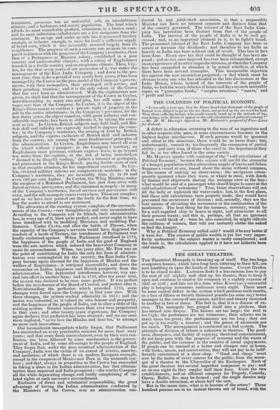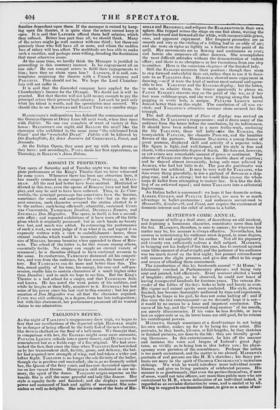THE GREAT THEATRES.
THE Theatrical Monopoly is breaking up of itself. The two huge overgrown houses, which have long been tottering to their fall, are now tumbling in upon the heads of their lessees. Covent Garden is to be closed to-day. LAPORTE finds it a less ruinous loss to pay the rent of 451. nightly and shut up his theatre, than to keep it open and continue to employ his company at a nightly expense of 2001. or 2501.; and this too at a time when KNowLos s successful play is bringing numerous audiences every night. There must be some radical defect in the system which produces such results, as a loss of fifteen or twenty thousand pounds (as some say) to one manager in the course of one season, and five-and-twenty thousand. to another in two or three. The fact is, that it is a disease of ex- cess. The monopoly has gorged itself into a plethora, that has turned into dropsy. The houses are too large; the rent is too high; the performers are too numerous; their salaries are in many cases too great; the performances are too long ; they are got up in too costly a manner ; and the prices of admission are too much. The management is conducted on a bad system. The principle of division of labour is unknown in theatres. The good- ness, cheapness, and facility of enjoying theatrical entertainment, do not keep pace with the progress of economy and the wants of the public, and the increase in the number of social enjoyments. If people can be amused at a better and cheaper rate at home, with books, music, and conversation, they will not pay to be indif- ferently entertained at a show-shop. " Good and cheap " must now be the motto of every caterer for the public, from the mana- ger of a theatre to the Chancellor of the Exchequer. Each of the great theatres has several imperfect companies to pay; and on no one night do they employ half their force. Unite the two establishments, and an efficient company for Tragedy, Comedy, Opera, Ballet, &c. may be formed ; and the single theatre may have a double attraction, at about half the cost.
But in the mean time, what is to become of the actors? Three hundred persons are in an instant thrown out of bread, .with-the families dependent upon them. If the manager is ruined by keep- ing open the theatre, it is quite clear the actors cannot keep it open. It is said that LAPORTE offered them half salaries, which they refused. Better lose part than all, we should think. Many of the actors might ir well content with one third ; but these are precisely those who will have all or none, and whom the sudden loss of salary will less affect. The multitude are less able to make such a sacrifice, and perhaps more willing, dreading the destitution that must otherwise ensue.
At the same time, we hardly think the Manager is justified in proceeding' in this summary manner. Is his engagement all on one side? He can compel actors to fulfil their engagements to him; have they no claim upon him ? LAPORTE, it is said, con- tetnplates reopening the theatre with a French company and PAGANINI. This should not be. We hope the Lord Chamber- lain will not suffer it.
It is. said that the discarded company have applied for the Chamberlain's licence for the Olympic. We doubt not it will be granted. But that theatre will not hold money enough to pay the principal actors their present high salaries: Let each be paid only what his talent is worth, and the speculation may succeed. We should like to see KNOWLES and ELLEN TREE on a smaller stage.



















 Previous page
Previous page